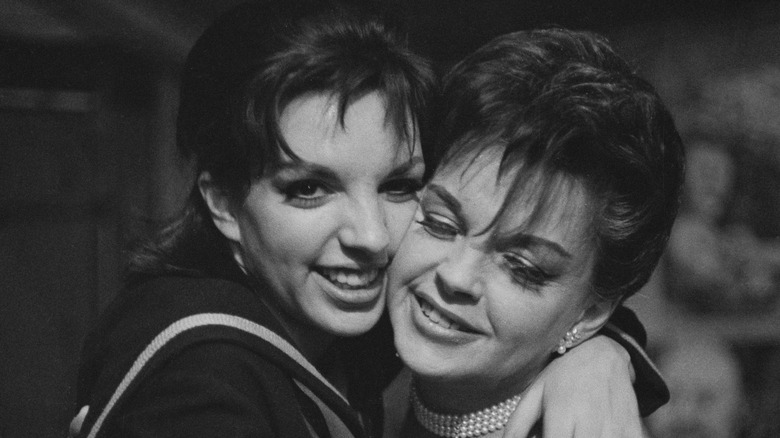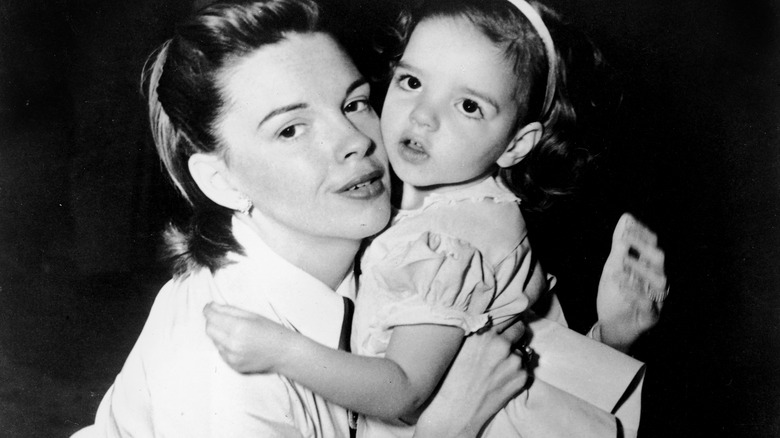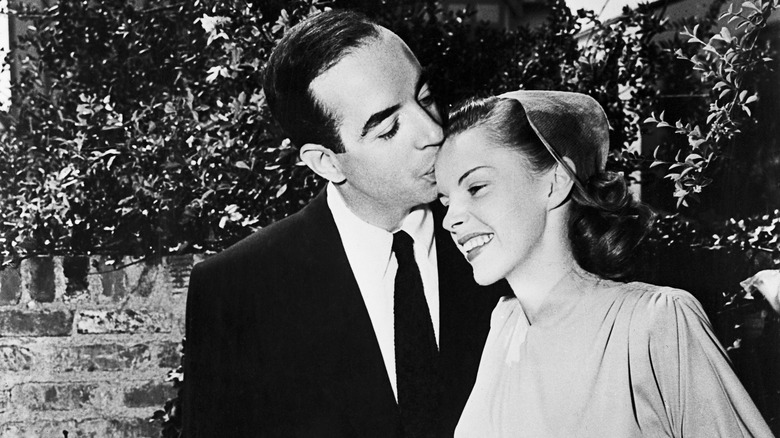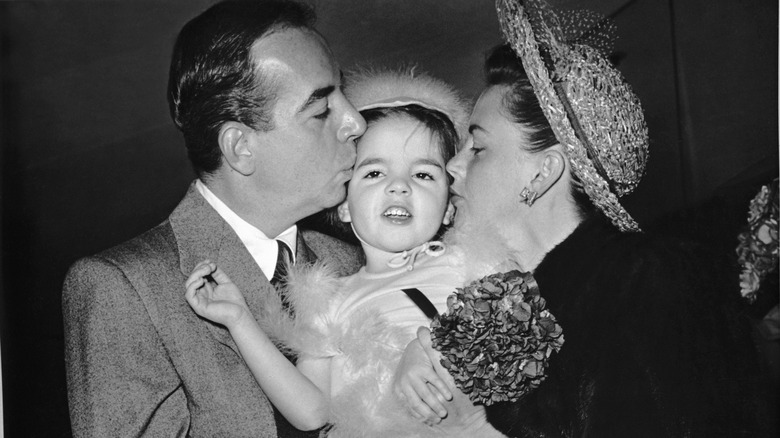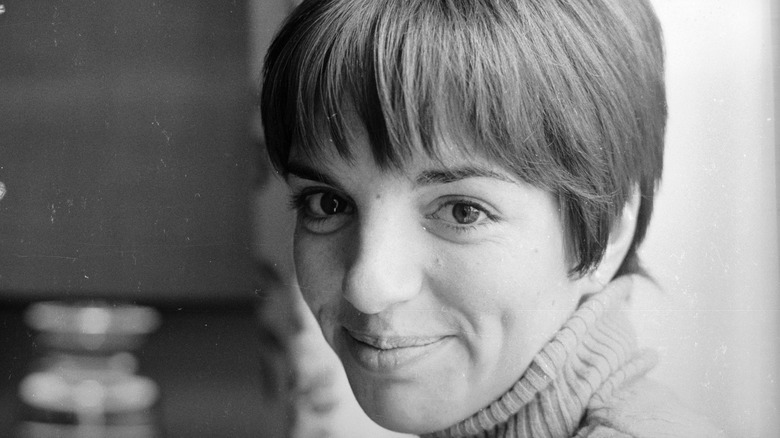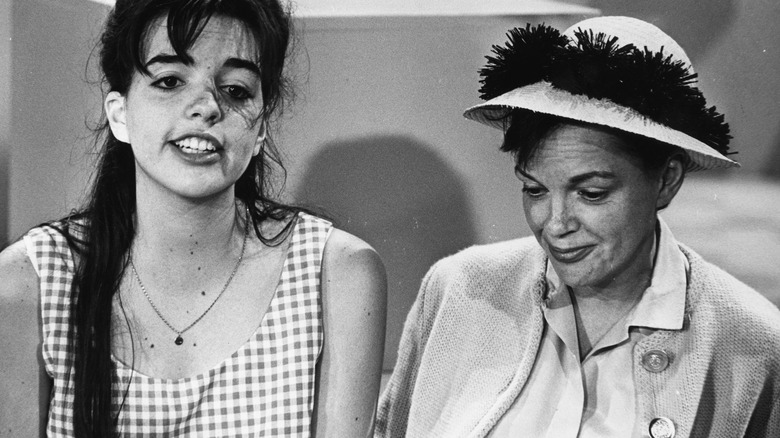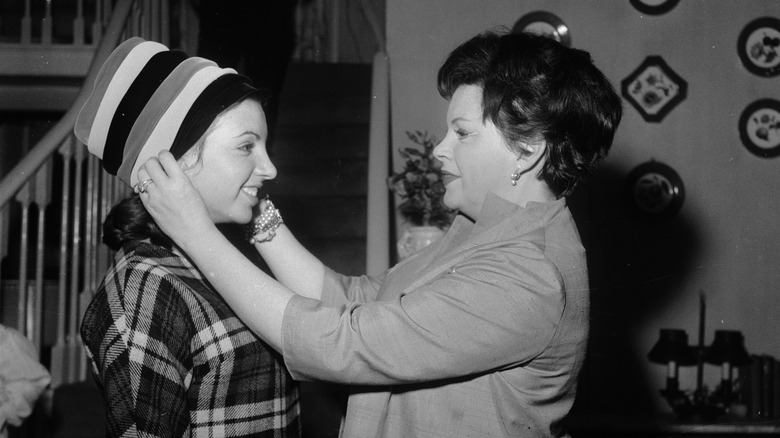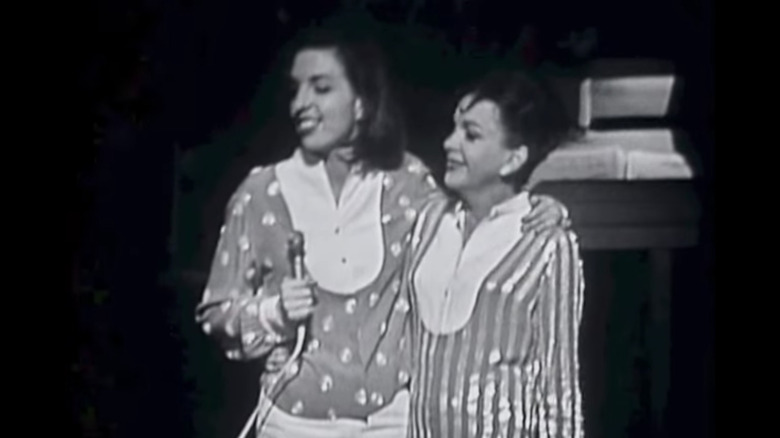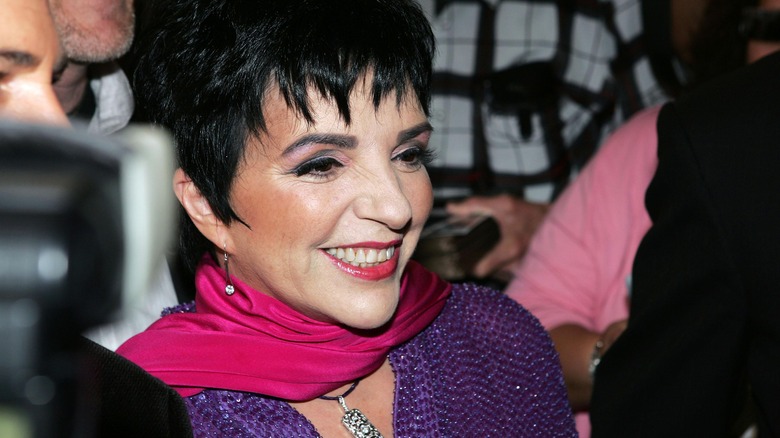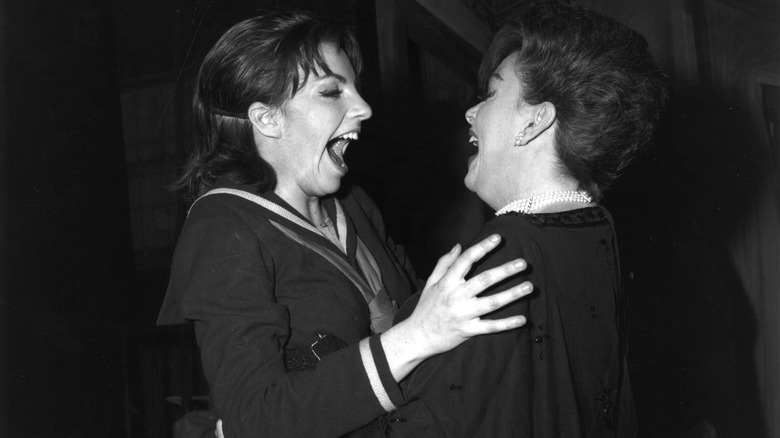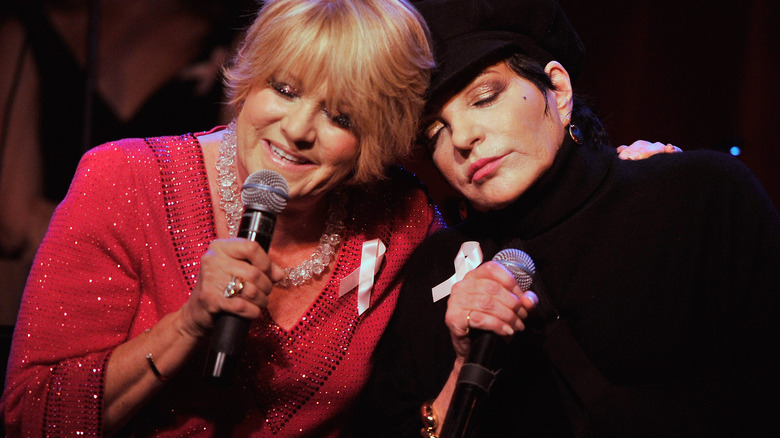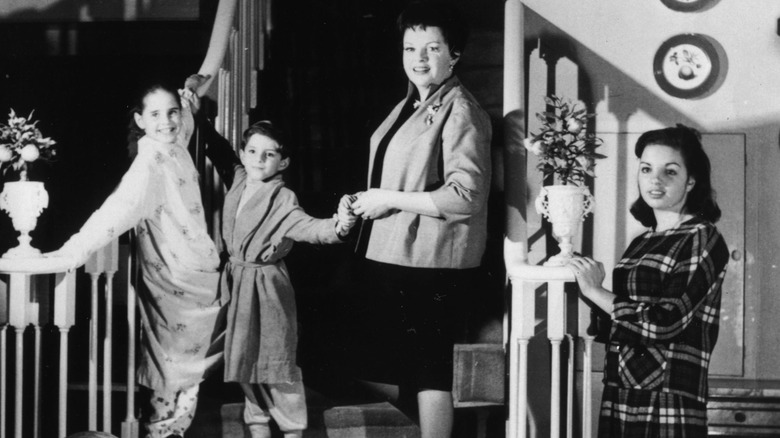Inside Liza Minnelli's Relationship With Her Mother, Judy Garland
Some people get their big break as child stars, some find fame later, and some are born into it. Liza Minnelli is definitely the latter: As the daughter of actress Judy Garland and director Vincente Minnelli, she summed up her first experiences with fame for Variety: "I was born and they took a picture."
Minnelli had the talent to back it up, though, and was still a teenager when she won the first award that would set her on the path to becoming one of the elite EGOT winners. According to CBS, the Tony came first, then the Oscar and the Emmy in the same year, and finally, the Grammy.
It had all happened pretty fast: In 1964, Garland was performing a series of shows at the London Palladium. That is when Minnelli took the stage alongside her. For Minnelli, it was one of the moments that made her realize that she was more than her mother's daughter: She was a star, too.
Still, she credits Garland with getting her there, saying, "My mom was my mom. You know, other people think of her as Judy Garland. That's Mama." She also said (via CBS), "I thought my mother was perfect, perfect. Every little thing she did."
Garland's life was far from perfect, though, and she dealt with devastating issues that spilled over into her children's lives. What did it mean for them, and for their relationship with their mother?
Liza Minnelli: Always treated like an adult
While some parents might hope that their children stay young forever, that wasn't the case with Judy Garland and her oldest daughter Liza Minnelli. In 1984, Minnelli spoke with The New York Times about her relationship with her mother, recalling, "I was always treated like a grown-up. There was no baby talk — ever." She remembered her mother saying, "Enough people are going to say goo-goo, ga-ga, when you're older. In other words, they'll double-talk you when you're older. So, I'll talk to you straight when you're young."
On one hand, it meant that Minnelli had — at a very young age — been exposed to all the hardships of being an adult: By the time she was three, she had heard stories of the difficulties of the real world, and by six, she could get whatever she needed from hotel room service. As she grew up, she found herself shouldering more and more, from overdue bills to facing the fallout of Garland's addictions and suicide attempts.
On the other hand, it also meant that she had a mother who was also her best friend. Still, Minnelli knew that meant she needed to make her own way. She left home at 16, bound for New York City. "[Garland] was smart enough to stay out of it," Minnelli recalled. "She never made calls. She said, 'I never want to be guilty of getting you a job,' and she's not."
If you or anyone you know is having suicidal thoughts, please call the National Suicide Prevention Lifeline by dialing 988 or by calling 1-800-273-TALK (8255).
Judy Garland: I don't give advice
When Judy Garland talked about her daughters, it was clear just how proud of them she was. In one 1965 interview, her face lit up with a kind smile when she was asked about Liza Minnelli. When she was asked what kind of advice she had for the up-and-coming performer, she gave a surprising response: "I don't give her any advice. She's very wise, and she's seen my mistakes and my fears and so forth. And she has her feet on the ground, all the time."
A 1984 piece for The New York Times quoted Garland as saying that although she would often sit and reflect on all the things she wanted to tell her daughter — particularly once she started falling in love with the show business life that Garland had struggled with for decades — she said that she would ultimately give her something else: unconditional support. While Minnelli recalled that there were moments when she saw jealousy in her mother's eyes, it was the support, encouragement, and guidance she remembered more. Garland's singular piece of advice remained constant: "Watch me, learn from me and learn from my mistakes."
Minnelli's struggles with alcohol and drug use would ultimately echo those of her mother, with outlets like E! News noting that she had repeatedly entered rehab facilities and sought help for addictions that started after she was prescribed Valium to help her cope with her mother's 1969 death.
If you or anyone you know needs help with addiction issues, help is available. Visit the Substance Abuse and Mental Health Services Administration website or contact SAMHSA's National Helpline at 1-800-662-HELP (4357).
How Judy Garland's mother shaped her relationship with her own daughter
Judy Garland was the daughter of vaudeville performers who pushed her onto the stage not long after her second birthday. Her mother, Ethel Gumm, was the first to give Garland — at just 10 years old — the pills that would ultimately lead to her addiction and untimely death from an accidental overdose at 47 years old, according to her biography, "Get Happy: The Life of Judy Garland" (via Town & Country).
Garland described her mother as an unrelenting stage mom, who Biography says pushed her family to move to California from Grand Rapids, Michigan after rumors of her husband's dalliances with teenage boys spread around town. California didn't mellow her, and Garland recalled: "She would sort of stand in the wings when I was a little girl and if I didn't feel good, if I was sick to my tummy, she'd say, 'You get out and sing or I'll wrap you around the bedpost and break you off short!' So, I'd go out and sing."
In another 1967 interview, Garland was asked about her mother and what influence she had on the way she related to her own children. She replied, "I don't think I liked her well enough to learn anything. I was just scared of her. I don't really know whether I subconsciously raised my children the exact opposite. I don't think I did — we just have an awful lot of fun and they're full of sunshine."
If you or anyone you know needs help with addiction issues, help is available. Visit the Substance Abuse and Mental Health Services Administration website or contact SAMHSA's National Helpline at 1-800-662-HELP (4357).
Liza Minnelli: There was never any middle ground
When Liza Minnelli spoke to Vogue in 2019, she described her relationship with her mother as being a set of extremes — and that's kind of understandable, given what Garland struggled with growing up. While she was America's sweetheart, she also had to deal with what studio bosses had to say, including Louis B Mayer's nickname for her — "little hunchback" — and directors like Charles Walters calling her things like, "the ugly duckling."
Minnelli went on to reflect on how it had impacted her mother and their life, saying it wasn't necessarily a rags-to-riches story, but more like a rags-to-riches-rides-a-rollercoaster. They spent a lot of time living in high-end hotels, but sometimes that came along with fleeing from the bills in the middle of the night. "There was never any middle ground when I was growing up," Minnelli recalled (via Vogue). "We either lived like we had millions in the bank, or we had no money at all."
It wasn't just like that with money and their lifestyle, either. Minnelli reflected that Garland's mood swings were also like a rollercoaster: extreme and unpredictable. Through it all, though, they were still very close. Minnelli even said (per Vogue), "As I became a teenager, I became her best friend and confidante."
Liza Minelli: On being compared to her mother
Judy Garland was just 47 years old when she died in 1969. According to her obituary in the LA Times, she suffered from a host of illnesses, including hepatitis, kidney problems, and complications from severe fluctuations in her weight. Liza Minnelli was just 23 years old when her mother died. Left without a mentor, it was up to her to find her own way in the world — and to find someone to give her direction.
That, says CBS, came in the form of French singer Charles Aznavour. After meeting just a few years after the death of Garland, Minnelli says Aznavour's knack for telling a story through his songs was what made her realize exactly that was what she wanted to do — and in doing so, she started distancing herself from Garland. She told Variety, "I was absolutely concentrated on not doing what my mom did."
Fred Ebb worked with Minnelli for a long time, helping her create her concerts. In 1984, he told The New York Times that for years, he had tried to get her to sing some of her mother's hits, but she refused until a show in 1982. Since then, she's said that if people connect with her mother through her, she's fine with it: "I guess what I'm trying to say is that I'm trying to be a good daughter."
Judy Garland fostered her daughter's singing career
Judy Garland has said (via Biography) that the only time she really, truly felt like herself was when she was singing — and that's in spite of a mother who gave her little-to-no choice in the matter and threatened her if she hesitated. Garland's relationship with Liza Minnelli and her influence on her singing career was quite the contrast.
Minnelli — along with longtime collaborator and friend Michael Feinstein — sat down with CBS Sunday Morning in 2022 and reminisced about her and her parents' careers. While she said that personality-wise, she was much more her father's daughter, it was her mother who shared the stage with her and calmed her nerves. Garland was the one to help her understand the stage.
Minnelli may have come to love performing, but that wasn't always the case. She recalled her early performances (via the New York Post): "If I get frightened, I'd look at her, and she would somehow know, and she would calm me down. Just by her look." She added that part of her insecurities came from a lack of belief in herself: "I wasn't a good singer. I was not. And I knew, because my mom was the best in the world."
The moment everything changed
By the time Liza Minnelli appeared on stage alongside her mother at a 1964 concert at the London Palladium, she'd already been on stage and on television. The massive theater was something entirely different, though, and when she wrote notes for the 2015 rerelease of the concert on vinyl, she revealed (via Playbill) that she hadn't wanted to do it. She'd turned her mother down, in fact, and only learned later that Judy Garland had already gone ahead and made the official announcement that she was going to be there.
"Nerves be damned, I was gonna give my all — all that I had in 1964," she wrote. She would tell The New York Times that it was that moment that everything changed. On stage, she saw a flash of jealousy — what she described as "the lioness that owned the stage and suddenly found somebody invading her territory." It was the moment when they both knew she was a performer, too. After a brief moment of terror on stage, Minnelli quickly realized her mother's jealousy had been a huge compliment. Minnelli would later go on to say (via Variety) that her mother quickly became her biggest supporter.
Liza Minnelli: Echoes of addiction
Liza Minnelli biographer Scott Schecter says (via NBC News) that the first time she checked into rehab, it was for alcohol addiction. She had been 30 years old at the time, and it would be the first of a number of trips. Minnelli has been candid about her addictions, telling The Guardian/Observer in 2008: "My whole life, this disease has been rampant. I inherited it, and it's been horrendous, but I have always asked for help."
Insight into her relationship with both her mother and her addictions came in a 1973 Rolling Stone interview. It wasn't Minnelli but her then-husband Peter Allen who explained that, when she was a child, Garland's doctor had pulled her aside for the sort of conversation that no one should expect a child to have with a parent's doctor. Minnelli was told that Garland was taking Nembutal, which the Laguna Treatment Hospital notes is a barbiturate usually used to treat short-term insomnia. She, however, had been taking so much for so long that an overdose could kill her. So, Minnelli was tasked with keeping her alive: It became her job to empty the capsules and replace the barbiturate with sugar as a placebo.
If you or anyone you know needs help with addiction issues, help is available. Visit the Substance Abuse and Mental Health Services Administration website or contact SAMHSA's National Helpline at 1-800-662-HELP (4357).
Liza Minnelli: What kind of happy was she?
Judy Garland famously went from the darling of "The Wizard of Oz" to tabloid headline fodder, and when the Los Angeles Times ran news of her 1969 death, they included a heartbreaking quote from her: "I've heard how 'difficult' it is to be with Judy Garland, but do you know how difficult it is to be Judy Garland? And for me to live with me? I've had to do it — and what more unkind life can you think of than the one I've lived?"
Liza Minnelli saw a different side of her ... if only for a short time. It was the kind of happiness that only a beloved child can bring, and Minnelli reminisced with Variety about how thrilled Garland had been to see her embrace performing. Minnelli would sing and dance for her and make her laugh. "She got such a kick out of it," Minnelli said. "It was like, 'Look what I made.' And I was so happy whenever she was happy."
Even as a child, Minnelli remembered wanting nothing more than to see her mother happy, and to hear her laugh. She recalled being no more than 5 and tickling her when she was sad. "She was funny, very funny, clear, incredibly intelligent, but more than you could even imagine, and in the moment."
Liza and her sister are very close — just like their mother wanted
Judy Garland would have turned 100 years old on June 10, 2022 — although Liza Minnelli told ET that she would have said, "I'm sorry, it's 99 and three-quarters." The outlet was talking to Minnelli and Garland's other daughter, Lorna Luft, about the occasion. The bond between the sisters gave a brilliant insight into their relationship with their mother.
They spoke about knowing how special their mother was from the moment they were born, and while living among Hollywood's biggest and brightest stars was typical for them, they knew that she was special. They also said that while they had memories like a late-night chat with Marilyn Monroe, Garland had always wanted the two of them to have a bond that couldn't be broken by Hollywood — and, they do. Luft explained: "Born into what we were born into, we didn't have a choice, but we made a choice to say to one another, it will always be the two of us, and who we decide to invite to the party will be our decision and that's why.'"
It hasn't always been easy, though: Three years prior, Luft had explained to Yahoo! that she and Minnelli had definitely had those moments of being not-so-close, which she chalked up to nothing more than sibling rivalry. Even then, she said, "My sister and I will always find our way back to one another, no matter what comes into being."
Liza Minnelli: Get rid of the bad, keep the good
In 2008, Liza Minnelli sat down with The Guardian/Observer, and the conversation turned to her famous parents. Reporter Lynn Barber was taken aback by Minnelli's insistence that she had a perfectly normal childhood, in spite of all the divorces, marriages, remarriages, step- and half-siblings, and the 14 different schools she went to. Until she got a little closer to the heart of the matter.
At the time, Minnelli said that she wasn't really interested in talking about her childhood — at least, not about her mother. Her father was a different story, as she said she identified much more closely with him. Perhaps, Barber posited, because her mother always looked for help from others, Minnelli became so necessarily self-reliant at a young age. Barber surmised, too, that she tended to have a rose-colored view of her childhood, particularly when she made the comment, "there are doors I don't want opened."
She said as much in an interview with The New York Times as well, saying that she preferred to hold onto the good memories and get rid of the bad ones. Was her relationship with her mother more complicated than interviews suggest? Undoubtedly — people are complicated, but people can also truly love each other through those complications. Case in point? Minnelli has long said that if she ever had a daughter, she would name her Judy.
